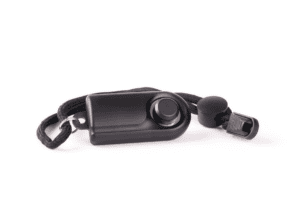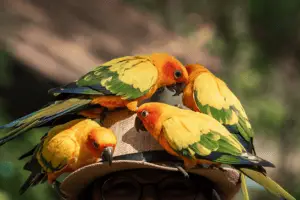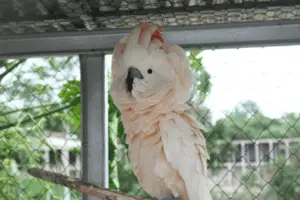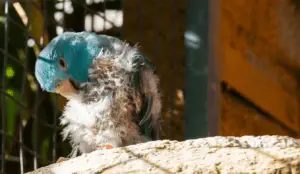If you’re thinking about small pets to take care of, you’ve probably heard of budgies. Budgies are small avian pets with great character and little maintenance.
These small Australian birds or Budgies are pets that are easy to maintain. This bird species is known to be very friendly, loving, and loyal to its owners.
Read on to find out the many reason reasons why Budgies are easy to take care of.
Budgies Like To Be Held
Suppose you’re wondering if budgies like it when you hold them; the answer is yes. Budgies are very social creatures that crave physical and emotional contact with their peers.
These little birds don’t mind the attention, even if you hold, kiss, or talk to them for long periods.
The behavior of budgies in a domestic setup affects the quality of life and the number of interactions they do with their surroundings.
Budges like to interact with those that they trust in their environment. If you are a budgie owner, your pet is most probably comfortable with being held by you. These creatures like to interact in structured social groups with other birds that extend beyond their partners and families.
These birds are such social creatures that some reported cases of budgies getting sick because of a lack of social interaction.
Budgies Can Be Left Alone
Budgies are known to be social creatures. You can keep a single budgie if you spend most of your time at home. But if you spend a lot of time outside your house, you may need another bird to keep your budgie company. In fact, it is beneficial to your budgie to get it a companion.
Most pet owners purchase budgies at least by pair. But yes, your budgie can be left alone in a short amount of time.
These creatures thrive well in environments where they can have social interactions. It includes interactions with other avian pets or even humans. If you are getting two budgies, check the bird’s compatibility, as some tend to display aggressive and dominating behaviors toward their peers. Budgies like to get comfortable with their peers first before they can effectively cohabitate. (Source)
There is nothing to worry about as budgies can quickly adapt to their environment. With enough interaction, some can eventually learn to mimic words and basic human sounds.
It is advisable to look for budgies that have been hand-fed growing up; this way, you can be sure that the budgie acclimated to human interaction.
Budgies Are Low Maintenance
Budgies are low maintenance and do not require much other than to be given their basic needs and of course, lots of attention. One of the simplest things you must remember when keeping a budgie as a pet is to keep them company.
Taking care of budgies doesn’t require much maintenance. They aren’t as messy as bigger types of parrots are, so you won’t always have to clean their cage multiple times a day.
Budgies Are Easy To Keep
Budgies don’t require much from their keepers. These creatures have the most extended lifespan of their kind. By providing them with their basic needs, then budgies are easy to keep.
This bird species can live for an average of 8 to 15 years, depending on the care you give your bird.
Budgies are species that like to have a lot of room to move around. They enjoy social interactions but don’t want stressful and noisy surroundings.
Place your pet’s cage where there is just enough light exposure to them. Also, check the room temperature to see if it’s too hot or too cold for your pet.
Owning A Budgie Is Easy!
Budgies are known to be very social and friendly birds. You can easily tame them as they are not afraid of social interactions with other birds or humans.
As long as your pet budgie is used to having humans as company, you won’t have a hard time taking care of it. Many birds behave this way as they are used to living with large flocks in the wild, which means that social activities make them more alert and active.
For domesticated budgies, the time you spend directly feeding your pet affects the amount of their food consumption. The frequency of feeding your budgie also affects its flight activity and cognitive development. (Source)
Give your budgie a cage large enough to flap their wings in, various materials or toys they can play with, and proper diet and caring for your budgie should be easy.
You can put perches on different parts of your pet’s cage to allow movement and exercise for your budgie.
How Much Care Does A Budgie Need?
Aside from the primary home care you can provide to your pet; you would have to visit an avian veterinarian once in a while. You can take your pet to the vet at least once every 6 to 8 months for the standard workup for blood & fecal exam.
Taking your pet regularly to an avian vet will allow you to immediately spot and address any impending disease or issues with your pet’s health.
The most common health issues for budgies have something to do with parasites, improper digestive function, and even chronic egg laying.
In severe cases, budgies not in well-kept environments acquire more serious parasitic, fungal, neoplastic, and even pathological diseases. (Source)
Your pet may also have difficulty moving around if they are not taken to the vet regularly to groom their nails and feathers.
Bonding Is A Must For For Success
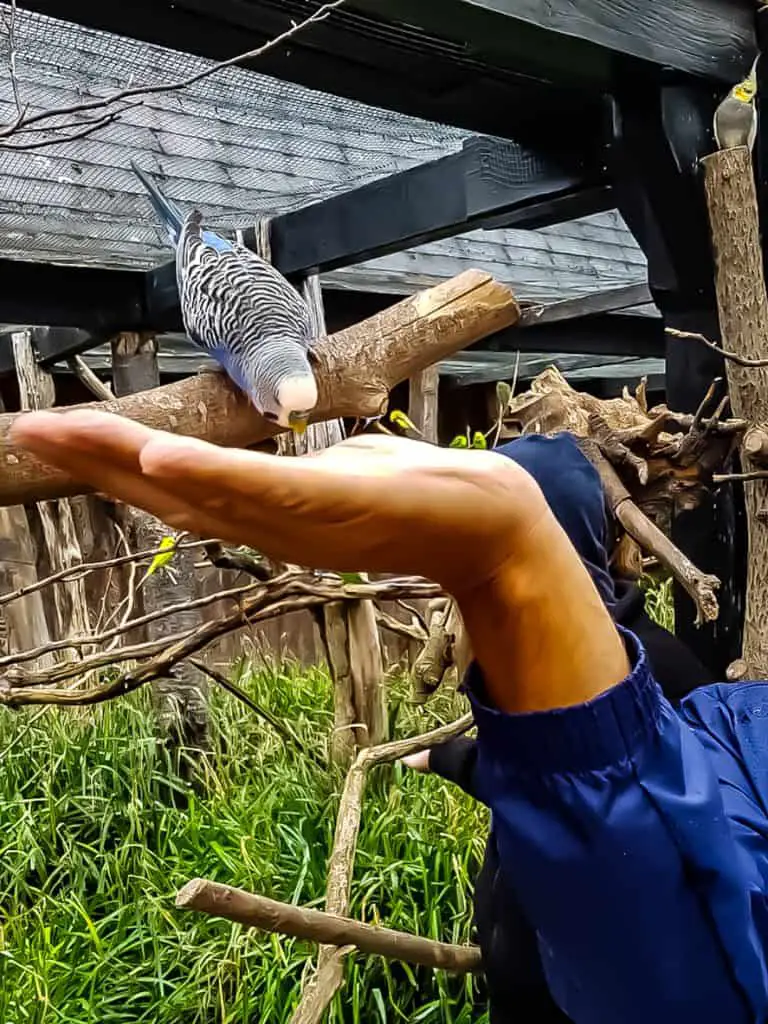
Budgies are vibrant creatures that usually like to be involved in social interactions. Engaging in conversations and physical interactions with budgie is the best way to strengthen your bond.
The more time you spend with your budgie, the more trust you will be able to build with it. If you’re not available to be around your budgie on most hours of the day, it’d be best to have someone else look after them while you’re gone.
Here are other tips on how you can bond with your budgie:
- Avoid Sudden Movements
Budgies are very observant of what goes on in their environment. They can easily sense the kind of energy in the room, and anything negative or harsh will only stress out your pet.
If you’ve just brought home your budgie, keep them in a space where there’s not much stressful activity. Avoid sudden movements as much as you can.
Moving calmly will let your pet understand that you don’t mean to attack them. Unlike what these birds are used to in the wild.
- Use A Calm Tone When Talking
Despite being amiable creatures, these birds quickly absorb all kinds of energy that they feel in their environment. If put in a setting with much noise pollution, budgies can quickly feel frightened.
The same goes when you are talking to your pet. Make sure that you use a low tone of voice and try to soothe your pet with the calmness of your voice. It will calm your budgie and let you create a good relationship with your pet.
- Give Your Bird Treats
The natural diet of budgies consists of seeds, fruits, and vegetables. It’s essential to provide your pet with varying foods daily to prevent them from becoming picky about what they eat.
If you’re training your budgie, one of the best ways to show appreciation to them is by giving them treats. It’s okay to give your budgie tasty treats from time to time.
Giving your pet, their favorite snacks can only improve your relationship with them. It communicates with your pet that you’re willing to provide for them, allowing them to trust you even more.
When preparing food for your budgie, make sure that you cut the fruits and vegetables into smaller pieces so your pet can quickly eat them.
Budgies that grow in the wild are known to be able to adapt their diet to the food available in the environment. During these times, these creatures can hone their hunting abilities through exploits for seeds and other resources. (Source)
- Play With Your Budgie
Creating a solid relationship with your budgie requires you to spend a lot of time with them. Please get to know your pet and what they do and don’t like.
Budgies are playful creatures, and they develop more cognitive functions when they socialize a lot.
Get your budgie a cage as big as you can. These birds are not only social beings, but they like to get involved in physical activities.
You can design their cage to have different perches and a playroom full of toys. It allows for mental stimulation on your pet and keeps them busy when you’re not around.
Parrots develop cognitive abilities even more; they’re stimulated with challenges that require innovative problem-solving. They also build their relationships by solving environmental challenges with each other. (Source)
- Be Patient With Your Budgie
Give your pet enough time to get used to its new environment. It may take your pet at least 4 to 7 days to get familiar with its new home and peers.
Don’t push too much bonding time during this period, as it can only hinder your pet’s ability to process its new surroundings. Allow your budgie to become comfortable is own phase, and it will eventually connect with you as you want.
The key is to make your budgie feel comfortable as much as possible. Give your pets proper lighting, ample space to move around, and a consistent supply of well-balanced meals.
- Speak Kind Words To Your Pet
Just like how one would nurture any relationship, encouraging your pet with good words and positive praises will let them know they are welcome.
If you’re training your pet to do a specific action, speaking words of affirmation can be a way for your pet to recognize when they are doing an excellent job at something.
Best Care For Your Budgie
There are three most essential things to remember if you want to have a stress-free time with your budgies. Ensure that you can keep them in a sizable cage that can allow them to extend their wings within it.
Provide your budgie with well-balanced meals to improve their cognitive, muscle, and even feather growth. Give your pet constant affection and time for interaction so it can develop an excellent state of mind.
- Luescher, Andrew U. DVM, Ph.D. “Manual of Parrot Behavior” https://books.google.com.ph/books?hl=en&lr=&id=zeMcEAAAQBAJ&oi=fnd&pg=PA43&dq=parrot+social+behavior&ots=7oKPU-wt-0&sig=7v20CcpCP49CGwotvH8IjdtbDpM&redir_esc=y#v=onepage&q=parrot%20social%20behavior&f=false.
- Speer, Brian “Normal and Abnormal Parrot Behavior” https://www.sciencedirect.com/science/article/abs/pii/S1557506314001037.
- Sandmeier, P “Budgie Diseases” https://www.cabdirect.org/cabdirect/abstract/20163005533
- Renton, Katherine “Lilac-Crowned Parrot Diet and Food Resource Availability: Resource Tracking by a Parrot Seed Predator” https://academic.oup.com/condor/article/103/1/62/5563039?login=true
- Bond, Alan & Diamond, Judy “Thinking Like A Parrot: Perspectives From The Wild” https://books.google.com.ph/books?hl=en&lr=&id=2Y-dDwAAQBAJ&oi=fnd&pg=PR7&dq=parrot+social+behavior&ots=gJlWrGhRoJ&sig=kT6Q26VWgr0MZ3XUJ-hxtKV0VCA&redir_esc=y#v=onepage&q=parrot%20social%20behavior&f=false



